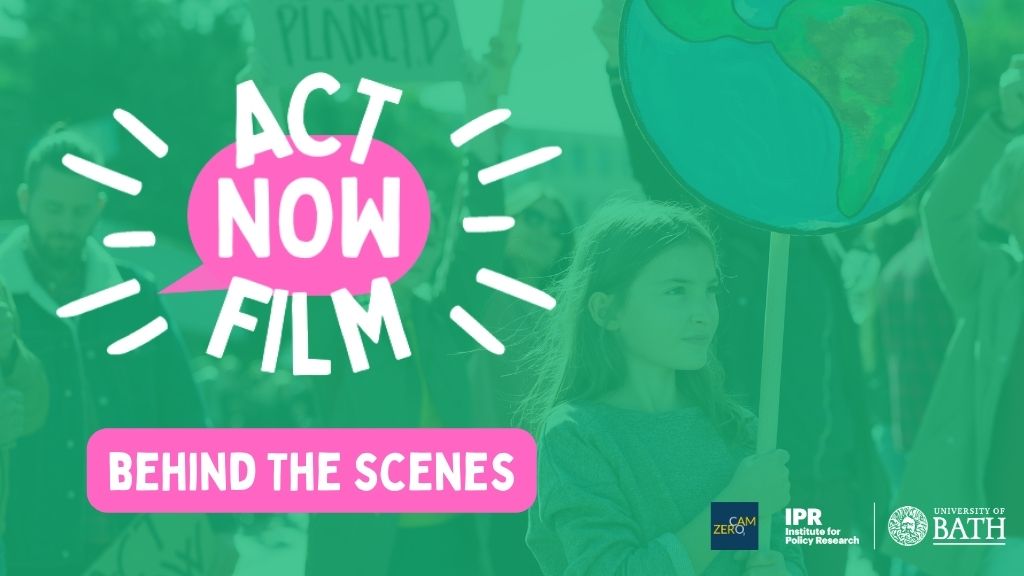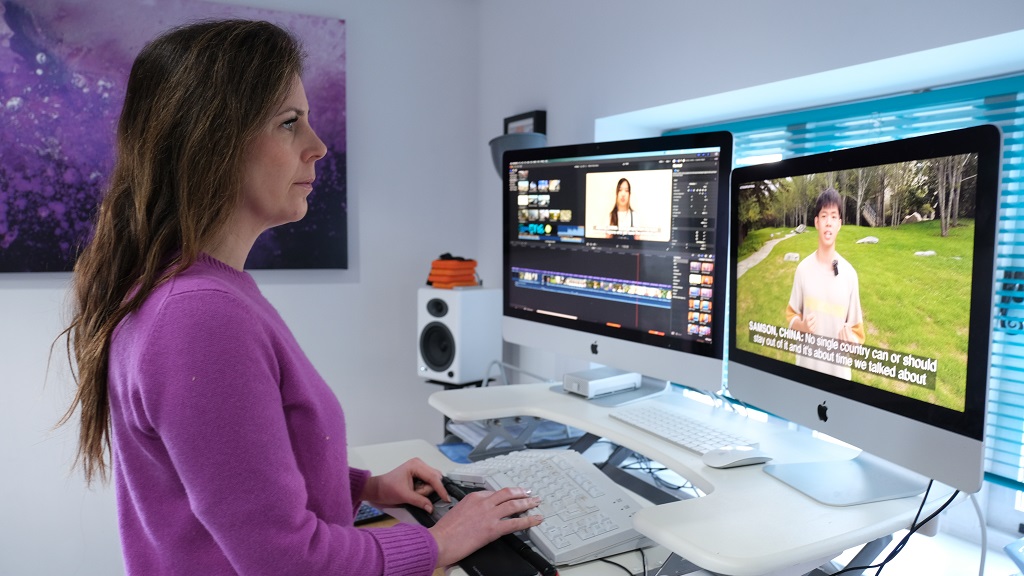The ActNowFilm project aims to amplify youth voices on the climate crisis. It is run by the University of Bath Institute for Policy Research (IPR) and Cambridge Zero, and supported by the UK Universities Climate Network (UUCN). This blog, which was first published on The Arts in Wiltshire blog, offers a peek 'behind the scenes' of the project. The author, Ellie Edwards, is a former BBC producer/ Director, and now owner of Octopus Films, a sustainable and ethical video production company.
My partnership with the ActNowFilm team started back in 2021. My company was asked by the University of Bath Institute for Policy Research (IPR) if we would be willing to partner with them to produce a film amplifying youth voices on climate. The brief was unique and ambitious: to feature young people from across the world sharing their lived experiences of climate change; their hopes and ambitions for the future; and their ‘asks’ of the climate change negotiators; as well as their own climate pledges. The film was an opportunity for them to share, in their own words, why stopping climate change is important to them – the future generation. The concept was devised by IPR alongside Cambridge Zero (Cambridge University’s response to the climate crisis), the Centre for Climate Repair and the Cabinet Office. The ultimate aim was to produce a film compelling enough to be shown at COP.
Ellie Edwards in the editing suite
My role was to give guidance on the process and carry out the editing – but not unduly influence the content, structure or tone with my experiences or perspective – the film had to represent young people. As a producer that goes somewhat against the grain, and I had to constantly keep myself in check.
Scripts, story boards and structures were all out the window – instead, we focused on collecting submissions from young people from over the world, talking about climate change, with a view to fleshing out a narrative after receiving the footage. This was alien to me – where the first question when working with film clients is usually what do you want to say? Or what do you want to show? This alternative approach made planning a challenge – although I have worked in film and television for 20 years, I was flummoxed as to how to logistically tackle such an unstructured project – everything was guesswork.
We had no idea how many submissions we would receive, and therefore how long it would take to transcribe them, or even how long the film ought to be. My usual carefully considered scheduling was out of the window. And what if we did not receive any submissions?
Well, we did. We were overwhelmed by the responses. 141 young people from 32 countries contributed filmed submissions. And so we got to work, helped by an international team of student volunteers who contributed in project management, communication, scripting, promotion, media work and music composition.
After many hours of transcribing, we were finally in a position to think about the narrative. This was driven by our student volunteers, although I offered feedback and support. This unusual way of working – scripting by student committee – bore rich results as it meant the film genuinely reflected the voices of the next generation.
Once the rough script was in place, I began the edit – and it soon became clear that we had something very special. A music student wrote an original score for the film, which complimented it perfectly. You can watch the final film below.
The next stage was to wait and see if we had been successful in producing a film worthy of being screened at COP. We were thrilled when the film was chosen! As well as COP, it has also been screened worldwide at events including Climate Week NYC, in addition to being shown to audiences in museums and schools. The film attracted a lot of publicity, such as this article in The Metro, and following its success, I was delighted to be asked to produce a film for the following year.
The second film was titled ActNowFilm: intergenerational conversations on climate change, and we again hoped it would be selected to be shown at that year’s COP. The concept was to feature intergenerational conversations from around the world in which young and older people share their experiences of climate change in their lifetimes; successful or unsuccessful initiatives; and their hopes and fears for the future. Although some contributors submitted their own clips, I was asked to interview some of them over video call. It was wonderful to be more involved this time, and ‘meet’ the inspiring contributors.
What was particularly striking for me was the number of young people who said they did not wish to have children, because of their fears about the sort of world they would be bringing them into. I am in my forties, and this had never occurred to me, or any of my friends, when we were younger. It was shocking how quickly these concerns have escalated.
The film was successful in premiering at COP28 as part of a panel talk and received wonderful feedback from the audience.
We are already planning the next film - ActNowFilm: youth climate leaders in conversation with climate experts. We will feature young people having 1-2-1 conversations with world leading international climate experts, from indigenous communities, business, the third sector and academia. Youth participants will be matched with experts for 1-2-1 conversations, providing opportunities for mutual learning and the sharing of both personal and professional experiences.
Being involved with the ActNowFilms has been a career highlight for me. I would love to hear your thoughts on the first two films, and any suggestions for future ones.
All articles posted on this blog give the views of the author(s), and not the position of the IPR, nor of the University of Bath.
Respond





